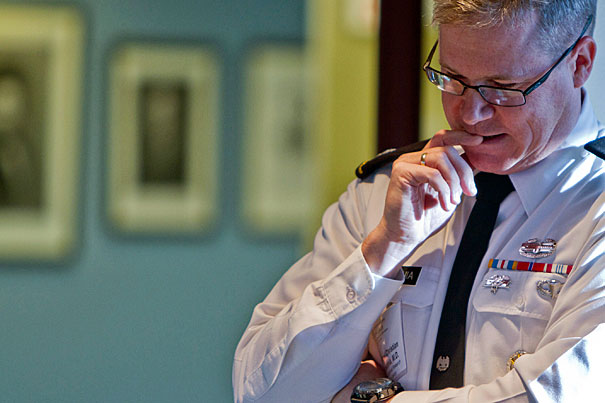
“As the president is bringing back our forces from Iraq, we have the enormous duty of figuring out ways to welcome people home,” said Col. Christian Macedonia during the opening remarks at a conference sponsored by the Harvard Kennedy School’s Ash Center for Democratic Governance and Innovation.
Meghan Dhaliwal/Harvard Staff Photographer
A better welcome home
New models to help veterans adjust after war are explored
An array of innovative approaches to help veterans took center stage Wednesday at a gathering of military leaders, community members, and academics at Harvard Kennedy School’s Ash Center for Democratic Governance and Innovation. As the country prepares to welcome home large numbers of servicemen and servicewomen from Iraq this winter, the conference “A Better Welcome Home: Transformative Models to Support Veterans and Their Families” explored approaches to help veterans connect to their communities and leverage their strengths in a tough job market.
“As the president is bringing back our forces from Iraq, we have the enormous duty of figuring out ways to welcome people home,” said Col. Christian Macedonia, who delivered the event’s keynote address, “The Sublime Joy of Serving Those Who Serve.” Macedonia is a military physician and program manager at the Defense Advanced Research Projects Agency who most recently served as the medical sciences adviser to the former Chairman of the Joint Chiefs of Staff Adm. Mike Mullen. “These soldiers are not broken china dolls or damaged goods — they have been through some experiences that the rest of society has not.”
“The good news is this country did learn the lesson of Vietnam: Whether [or not] you are happy about the mission, you should always admire the service,” said Harvard Kennedy School Dean David T. Ellwood in his opening remarks. “And there is so much more to be done. When our servicemen and women return from putting their lives on the line for their country, they should be thanked with not only a pat on the back, but a future.”
Emmy-winning director Mark Harris filmed the conference, which included presentations from a diverse group of public and nonprofit organization on three topic-specific panels: “New Frontiers in Services,” “Healing through Action,” and “Creating Community Connections.” Panelists shared a host of alternative treatments, including art therapy, outdoor recreation, and veteran-civilian dialogue, which have become integral to overcoming traumatic war experiences for many veterans.
The conference comes on the heels of some startling employment statistics: According to the U.S. Department of Labor, the unemployment rate of post-9/11 veterans had risen from 10.4 percent the year prior to 11.7 percent in September 2011, while the national unemployment rate was 9.1 percent over the same period. Among male veterans ages 18 to 24 the unemployment rate is 27 percent.
“The last decade of wars in both Afghanistan and Iraq has certainly put the challenges faced by our veterans at the forefront of national concern,” said Anthony Saich, director of the Ash Center and Daewoo Professor of International Affairs. “We were pleased to host such an inspiring group of individuals providing notable alternatives to more mainstream models of care. From service dogs to social networking sites, these participants demonstrated that all of us have a responsibility to ensure the homecoming of our veterans is more than just yellow ribbons and flashy parades.”





